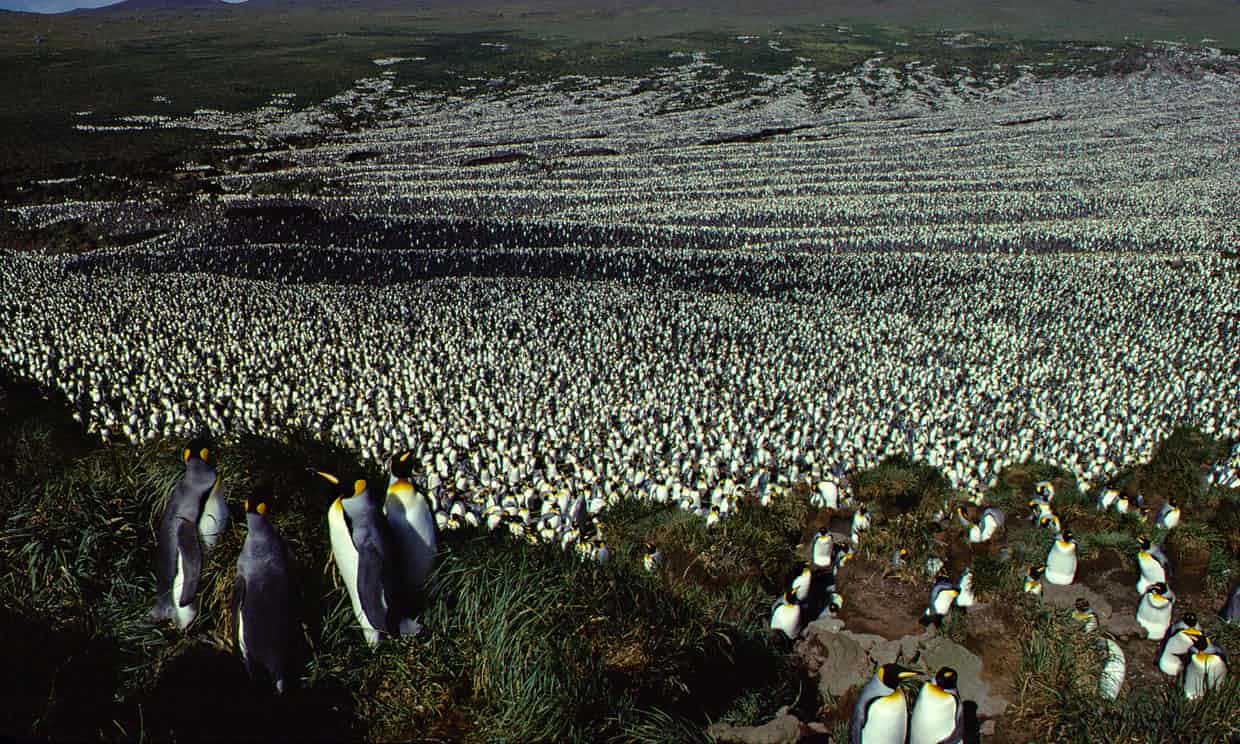Penguin population shrinks by 90%
July 31, 2018 | Expert Insights

Research suggests that, since the 1980s, the world's largest king penguin colony has shrunk nearly 90%.
Background
Climate change is a change in the statistical distribution of weather patterns when that change lasts for an extended period of time. Global warming is the observed century-scale rise in the average temperature of the Earth's climate system and its related effects. Climate change poses a fundamental threat to the places, species and people’s livelihoods. Sea levels are rising and oceans are becoming warmer. Longer, more intense droughts threaten crops, wildlife and freshwater supplies. From polar bears in the Arctic to marine turtles off the coast of Africa, our planet’s diversity of life is at risk from the changing climate.
Recent studies have shown that the earth’s rich biodiversity is threatened by increasing climate change.The IUCN Red List is a system of assessing the global conservation status of species. According to the IUCN list, dodo, Javan tiger, easter cougar, blackin cisco and the California grizzly bear are in the list of extinct species. Species that face an extremely high risk of extinction in the immediate future like the Asiatic cheetah, lion, bactrian camel, Arabian leopard and chinese alligator are in the critically endangered list.
King penguins are the second-largest penguin species after the Emperor. They do not make a nest, but rather lay one egg at a time and carry it around on their feet covered with a flap of abdominal skin, called a brood patch. Parents take turns incubating the egg, switching every couple of weeks over a two-month period.King penguins eat small fish, mainly lanternfish, squid and krill. They are somewhat less reliant on krill and other crustaceans than most Southern Ocean predators. On foraging trips king penguins repeatedly dive to over 100 metres, and have been recorded at depths greater than 300 metres.King penguins breed on the subantarctic islands at the northern reaches of Antarctica, South Georgia, and other temperate islands of the region.
Analysis
According to a new study, published in the journal Nature Climate Change,rising temperatures and overfishing in the pristine waters around the Antarctic could see king penguin populations pushed to the brink of extinction by the end of the century.Researchers have warned that the planet’s largest colony of king penguins has declined by nearly 90% in three decades.The last time scientists set foot on France’s remote Île aux Cochons, which is roughly half way between the tip of Africa and Antarctica, the island was blanketed by 2m of the penguins.But recent satellite images and photos taken from helicopters show the population has collapsed, with barely 200,000 remaining.
Scientists believe that climate change may play a role. In 1997, a particularly strong El Niño weather event warmed the southern Indian Ocean, temporarily pushing the fish and squid on which king penguins depend south, beyond their foraging range.This resulted in population decline and poor breeding success for all the king penguin colonies in the region.El Niño events can be amplified by global warming. An earlier study indicated that climate change, on its current trajectory, will probably make the Crozet islands,the archipelago that contains Île aux Cochons, unviable for king penguins by mid-century.
Migration is not an option because there are no other suitable islands within striking range.Other factors may be contributing to the decline of the Île aux Cochons colony, include overcrowding. “The larger the population, the fiercer the competition between individuals,” noted a statement from France’s National Centre for Scientific Research, which funded the study.
The Red List of Threatened Species conservation status for king penguins is currently “least concern,” but the new data may prompt a reevaluation.Le Bohec, who led the study with Robin Cristofari from the Centre Scientifique de Monaco and Emiliano Trucchi from the University of Ferrara in Italy, said the plight of the king penguin should serve as a warning about the future of the entire marine environment in the Antarctic.
Scientists and environmental campaigners are pushing for the creation of the world’s biggest marine protection area in the Antarctic. If successful the 1.8m sq km fishing-free zone would protect species, such as penguins, leopard seals and whales. Experts say it would also help mitigate the effects of climate change, soaking up huge amounts of carbon dioxide from the atmosphere and locking it away in deep-sea sediments.The proposal, which is backed by a range of governments and being championed by Greenpeace, goes before the the Antarctic decision-making body Convention for the Conservation of Antarctic Marine Living Resources (CCAMLR) later this year.
Assessment
Our assessment is that King penguins are key species for understanding and predicting impacts of global change on the marine biome. We feel that the as sensitive indicators of change in marine ecosystems, the King penguin need to be kept in a protected zone to ensure that they do not retreat to islands with harsher conditions. We believe that with the appaling outcome of the study, proactive and efficient conservation efforts need to be carried forward with coordinated global action against climate change.








Comments